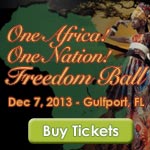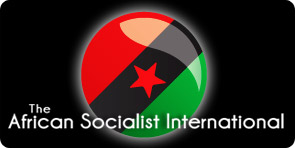Political Report to the Fifth Congress of the African People’s Socialist Party
Join the online studies / discussions: May 2 | May 9 | May 16
Table of Contents
- Imperialists cannot stem tide of national liberation
- The Party is the anti-colonial force in this time
- African People’s Socialist Party is heir to Marcus Garvey
- Pan-Africanism was the petty bourgeoisie; Garvey led the African working class
- African Internationalism advances Garvey Movement, defines imperialism in crisis
- African Internationalism shows the way forward
- African Internationalism led on the issue of reparations
- African workers must lead the struggle against parasitic capitalism
- ASI is the basis for a genuine Communist International
- White nation-state built on pedestal of slavery, colonialism
- White communists must be committed to overthrowing white power
- The African Socialist International is growing in Africa
- ASI resolution adopted at Party’s First Congress
- InPDUM leads mass resistance
- Revolutionary National Democratic Program: the political basis for black power
- Black is Back Coalition helps to advance RNDP
- African People’s Solidarity Committee another vehicle against U.S. imperialism
- White people must side with African workers not parasitic capitalism
- AAPDEP a tool against parasitic capitalist development
- AISO wins students to African Revolution
- African Redemption Church: the Party’s response to religious idealism
- Influencing and organizing African labor
- Party must address issue of African mass incarceration
- Formalizing the leadership of African women
- Solve the problem of recruitment
- Accountability and democratic centralism
- Party’s Department of Agit Prop has made great leaps
- Cadre development and leadership is key
- Office of Economic Development builds culture of self-reliance
Party must address issue of African mass incarceration
The Party’s Fifth Congress must resolve to re-establish the African National Prison Organization (ANPO) or some other similar organizational vehicle that can intervene in this critical question of the mass incarceration of African people. In 1979 the Party did organize ANPO as a response to this nakedly brutal attack on the democratic rights and integrity of our colonized community. Internal contradictions within the Party, including a lack of capacity for consistent leadership of ANPO, allowed the organization to die an early death.
Today, with more than 2.3 million people in prisons, the U.S. has by far the largest prison population in the world, outnumbering China’s prison population by nearly a million people. One of the obvious reasons for the high number of prisoners in the U.S. is the presence of Africans and other internally colonized subjects. Africans, who according to the U.S. census only make up 13 percent of the population of the U.S., account for at least half of those in prison.
Lame explanations for this rate of incarceration of our people include such inanities as dysfunctional families and pathological communities, poor economies in communities of high African concentration, inadequate job skills, and the like.
However, all these explanations fail to recognize that historically some form of incarceration has victimized our people since we were brought to the shores of the U.S. as enslaved captives. Even at the end of formal enslavement of our people, the 13th Amendment to the U.S. Constitution, passed by Congress in January 1865, gave “democratic” cover for our continued enslavement through use of prison, with these words:
“Neither slavery nor involuntary servitude, except as a punishment for crime whereof the party shall have been duly convicted, shall exist within the United States, or any place subject to their jurisdiction.” (Emphasis added)
The true measure of the significance of these words for Africans and prison was to be seen in the post-slavery implementation of convict leasing throughout the South. Convict leasing, characterized as “worse than slavery,” was a heinous practice of leasing Africans who were convicted on contrived, sometimes designer charges, to plantations of former slave owners and major U.S. corporations and mines.
Convict leasing was considered worse than slavery because unlike the situation with despotic and vermin-like slave owners who had some stake in the preservation of their African private “property,” the African convict was the property of the state and the degenerates to whom he was leased had no concern for his safety or well-being. The slogan of convict leasing was “One dies, get another.”
In addition to being subjected to the most dangerous, backbreaking, dirty and dignity-crushing labor, torture was a sport that was commonly practiced against imprisoned Africans.
When the system of convict leasing was finally ended after almost a hundred years duration, special prisons that replicated the plantation system of slavery were used throughout the South to control the colonized African population and extort more slave labor from Africans. Prisons like Atmore-Holman and Parchman in Alabama and Mississippi and Raiford and Angola in Florida and Louisiana became the models for the prison system throughout the U.S.
Today the prisons are cesspools of murder, rape and other forms of violence that are condoned and encouraged throughout the prison system as a means of bestializing and controlling the prisoners as well as the general African population. Special Housing Units (SHU) that utilize sensory deprivation and mind warping techniques are gratuitously used as means of torture.
While the entire prison system is a form of class oppression, it has a special character in the U.S. that is strongly influenced by its use as a tool of control of Africans, Mexicans and other colonial subjects. It is the use of prisons as a tool of colonial control — its use to control the “others” — that make its bloody tradition and practices permissible to the oppressor nation citizens, even though whites who are imprisoned for lesser durations and with less frequency for similar “offenses” also experience a measure of prison brutality as a form of class oppression.
We are a captive and colonized population that has never known a measure of freedom since our sojourn in the U.S. We consider all Africans imprisoned in the U.S. to be political prisoners. Because colonialism deprives a subject people of its access to self-determination the relationship between the colonizer and the colonized is illegitimate, notwithstanding the efforts of the colonizer to paint its oppression in democratic terms.
This means that all who violate the colonial laws of the U.S. are, in fact, violating an illegitimate relationship that was imposed on a whole people at the point of a gun or through some other form of extortionary violence. It is this reality that makes political prisoners of all Africans held in U.S. prisons.
In addition to ordinary African political prisoners, who we refer to as “non-conscious” political prisoners, U.S. prisons are filled with “conscious” political prisoners, those who have been imprisoned because of acts of resistance or who, while imprisoned were penalized further for acts of resistance. These are men and women who are rotting in prison cells in addition to all those who are imprisoned because of the frame-ups common to our experience as colonial subjects.
The use of the death penalty is another concern that we must address when dealing with the issue of Africans and prisons. It is no accident that the states with the highest incidence of death penalty cases are those with high concentrations of Africans and other colonized people.
The death penalty is another vicious tool of class oppression that expresses itself most sharply against colonial subjects, especially Africans. Opposition to the death penalty must be a defining plank in our anti-prison work.
We must build a prison organization that will take up the issues of political prisoners as well as those others who are unjustly imprisoned according to the class-based colonial laws of the U.S.
But just as important, we have to build a prison organization that will attack the prison system in its totality as a tool of colonial oppression. Our people and the world must be brought to the understanding that U.S. prisons are despicable organizations of mass torture and brutality and that the prison system is a multi-billion dollar colonial industry that has functioned as economic stimulus for the white population for many years.
The Party’s prison organization must make it clear that the real crime is America itself and not the victims of America who are rotting in the colonial prison concentration camps.
We must support all meaningful, non-opportunist efforts to reform the prison system and bring immediate relief to those who are festering in its grips. However, our main task must be to throw open the cell doors and free our people from this form of colonial terror. We must oppose the prison system with all our strength. We must ignite a hatred of the prison system in our people that will make it impossible for the colonial state to successfully maintain its effectiveness against our people and our struggle.
We must also remember that because prison is such a highly concentrated form of class warfare and national oppression, it lends to an easier achievement of revolutionary consciousness among its victims. Prisons must be recognized as critical bases for recruitment into the ranks of the Revolution, and our prison organizational work must have such recruitment as its highest objective. Behind the prison walls are a stationary, highly concentrated population of potential students of revolution who must be transformed into revolutionary anti-colonial weapons of conscious African resistance.














